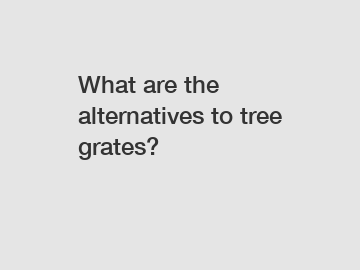What are the alternatives to tree grates?
What are the alternatives to tree grates?
When it comes to urban landscape design, tree grates have long been used as a popular option to protect tree roots and integrate trees into the pedestrian environment. However, there are several alternatives to traditional tree grates that offer unique advantages and address some of the limitations of this conventional choice.
One alternative to tree grates is the use of permeable paving systems. These systems allow rainwater to infiltrate the soil and reach tree roots, promoting better water and nutrient absorption. Permeable pavements, such as permeable interlocking concrete pavers (PICP) or porous asphalt, can effectively replace tree grates by providing a stable surface for pedestrian traffic while also allowing for water permeability.

Another alternative is the concept of suspended pavement systems. Instead of directly covering the area around the tree with a grate, these systems elevate the pavement to create a void space beneath, allowing for the growth of tree roots and preventing soil compaction. This innovative solution not only protects the trees but also provides a unique visual element in urban areas.
In recent years, more attention has been given to the idea of incorporating bioswales or rain gardens as an alternative to tree grates. These vegetated areas not only provide a naturalistic aesthetic but also serve as stormwater management solutions. By capturing, filtering, and infiltrating stormwater runoff, bioswales can reduce the burden on traditional drainage systems while also supporting the growth and health of nearby trees.
The choice of alternative to tree grates should be based on various factors, including the specific urban context, tree species, and intended benefits. Permeable paving systems are particularly beneficial in areas with high rainfall, as they ensure adequate water access for tree roots. On the other hand, suspended pavement systems may be more suitable for sites where space is limited and the visual appearance of an elevated pavement is desired.
The adoption of alternatives to tree grates carries several advantages. Firstly, it allows for better tree growth and health by providing adequate soil aeration, moisture, and nutrients. This, in turn, contributes to the overall greening of urban areas, improving air quality and creating a more pleasant pedestrian experience. Moreover, alternative solutions often offer a more aesthetically pleasing and customizable design, allowing for greater integration of trees into the urban landscape.
In conclusion, while tree grates have been a common choice for protecting tree roots in urban environments, alternative solutions such as permeable paving systems, suspended pavement systems, and bioswales offer innovative and effective options. These alternatives provide not only functional benefits but also contribute to the overall sustainability and aesthetics of urban landscapes. By exploring and adopting these alternatives, we can create a more tree-friendly and resilient urban environment.
If you are looking for more details, kindly visit cast iron tree grate manufacturer, wholesale picnic tables, wholesale picnic tables price.


